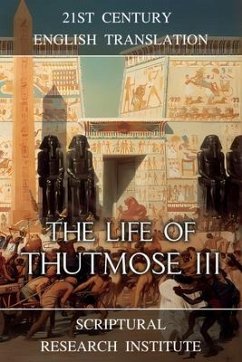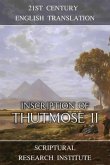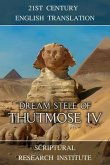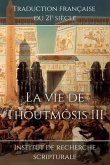Thutmose III was the king of Egypt between circa 1458 and 1425 BC, after inheriting the throne from his father Thutmose II and his aunt Hatshepsut, however, after Hatshepsut died Thutmose III claimed to have been the king of Egypt throughout Hatshepsut's reign, meaning his regal years began circa 1479 BC when his father Thutmose II died. This attempt to erase Hatshepsut as a king of Egypt was likely not personal, as he did not attempt to usurp her authority during his life, but more likely an attempt to restore the respect for the kingship that appears to have been lost while Hatshepsut was on the throne. The graffiti of Hatshepsut dressed as the king and having sex with a man found near her mortuary temple clearly shows that she was not respected the way the previous god-like pharaohs had been, and Thutmose III was almost certainly trying to erase what many Egyptians viewed as a distasteful episode of their history. Ironically, her mortuary temple is viewed as one of the greatest architectural monuments of the New Kingdom and served as the basis of all later mortuary temples of the New Kingdom. Thutmose III did not attempt to erase Hatshepsut's existence from Egyptian history, just her kingship, and she was still spoken of fondly as the 'queen' and 'favorite wife of Thutmose II.'
Her reign seems to have been one of contracting frontiers, as Egypt appears to have lost control of Syria early in her reign, which Thutmose III quickly reversed, launching an invasion of Syria within his first year on the throne. This was the legendary Siege of Megiddo, against the king of Kadesh and his Syrian allies, inscribed in detail in the Annals of Thutmose III at Karnak. The details of the battle inscribed at Karnak were copied from Thutmose III's scribe Tjaneni's journal and is a far more detailed account than the subsequent list of battles and plunder taken during Thutmose III's subsequent invasions of Northern Canaan and the Mitanni Empire in modern Syria, or his campaign against the Nubians.
The Capture of Jaffa is another battle reported to have taken place during Thutmose III's reign, although is generally considered a fictionalized account, as it was found with a copy of The Doomed Prince which is considered ancient Egyptian fiction. How much of the Capture of Jaffa is considered fiction, and how much is historical has been a matter of debate, largely because of the similarities to Homer's account of the Battle of Troy. The surviving copy of this text was discovered on a papyrus scroll dating back to the Ramesside Period, hundreds of years before Homer wrote the oldest surviving account of the Trojan War. Moreover, the Capture of Jaffa is set centuries before the Trojan War, and while there is a similar story of soldiers being hidden inside a tribute taken into the city, the stories are different overall. Moreover, given Capture of Jaffa appears to have been a popular enough story that it was being copied in Egypt at the time of the Trojan War if the story of the wooden horse actually happened, the Achaeans may have gotten the idea from the Capture of Jaffa.
Her reign seems to have been one of contracting frontiers, as Egypt appears to have lost control of Syria early in her reign, which Thutmose III quickly reversed, launching an invasion of Syria within his first year on the throne. This was the legendary Siege of Megiddo, against the king of Kadesh and his Syrian allies, inscribed in detail in the Annals of Thutmose III at Karnak. The details of the battle inscribed at Karnak were copied from Thutmose III's scribe Tjaneni's journal and is a far more detailed account than the subsequent list of battles and plunder taken during Thutmose III's subsequent invasions of Northern Canaan and the Mitanni Empire in modern Syria, or his campaign against the Nubians.
The Capture of Jaffa is another battle reported to have taken place during Thutmose III's reign, although is generally considered a fictionalized account, as it was found with a copy of The Doomed Prince which is considered ancient Egyptian fiction. How much of the Capture of Jaffa is considered fiction, and how much is historical has been a matter of debate, largely because of the similarities to Homer's account of the Battle of Troy. The surviving copy of this text was discovered on a papyrus scroll dating back to the Ramesside Period, hundreds of years before Homer wrote the oldest surviving account of the Trojan War. Moreover, the Capture of Jaffa is set centuries before the Trojan War, and while there is a similar story of soldiers being hidden inside a tribute taken into the city, the stories are different overall. Moreover, given Capture of Jaffa appears to have been a popular enough story that it was being copied in Egypt at the time of the Trojan War if the story of the wooden horse actually happened, the Achaeans may have gotten the idea from the Capture of Jaffa.
Dieser Download kann aus rechtlichen Gründen nur mit Rechnungsadresse in A, D ausgeliefert werden.









